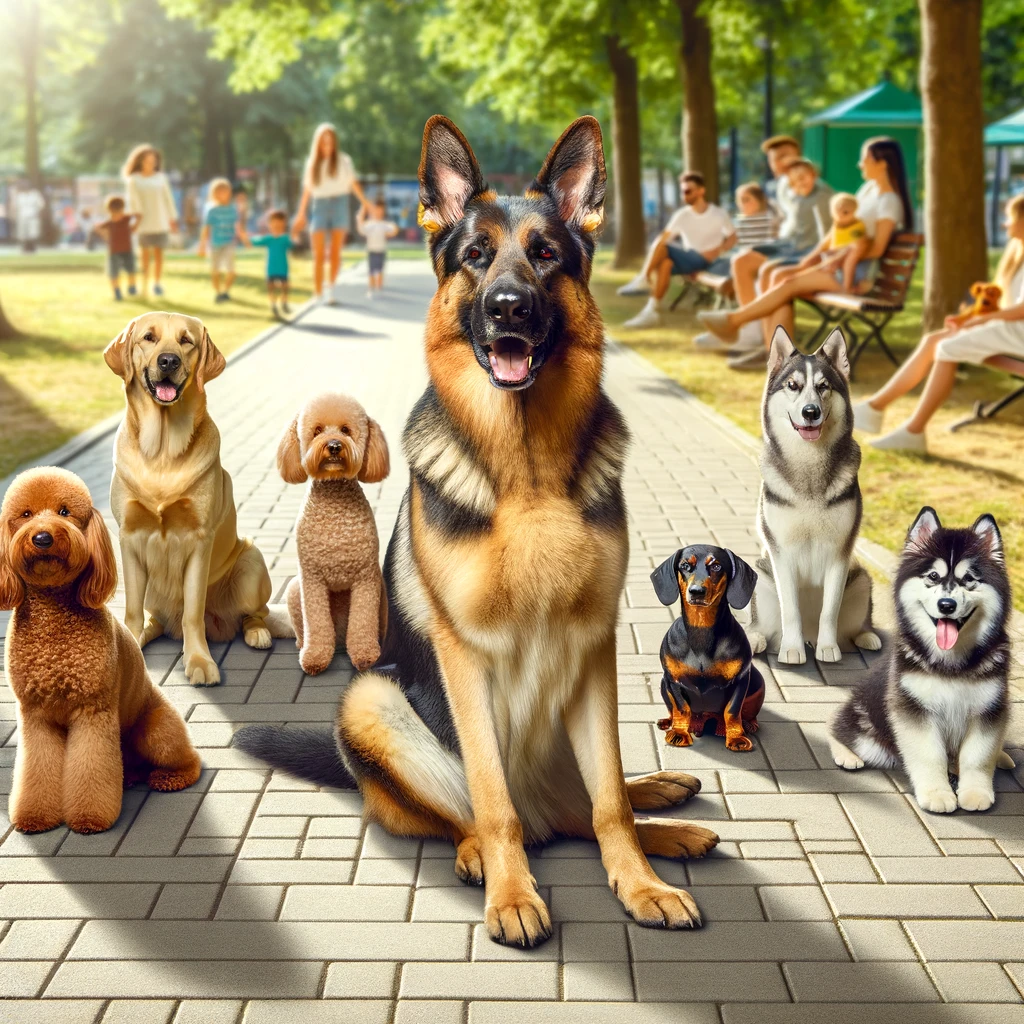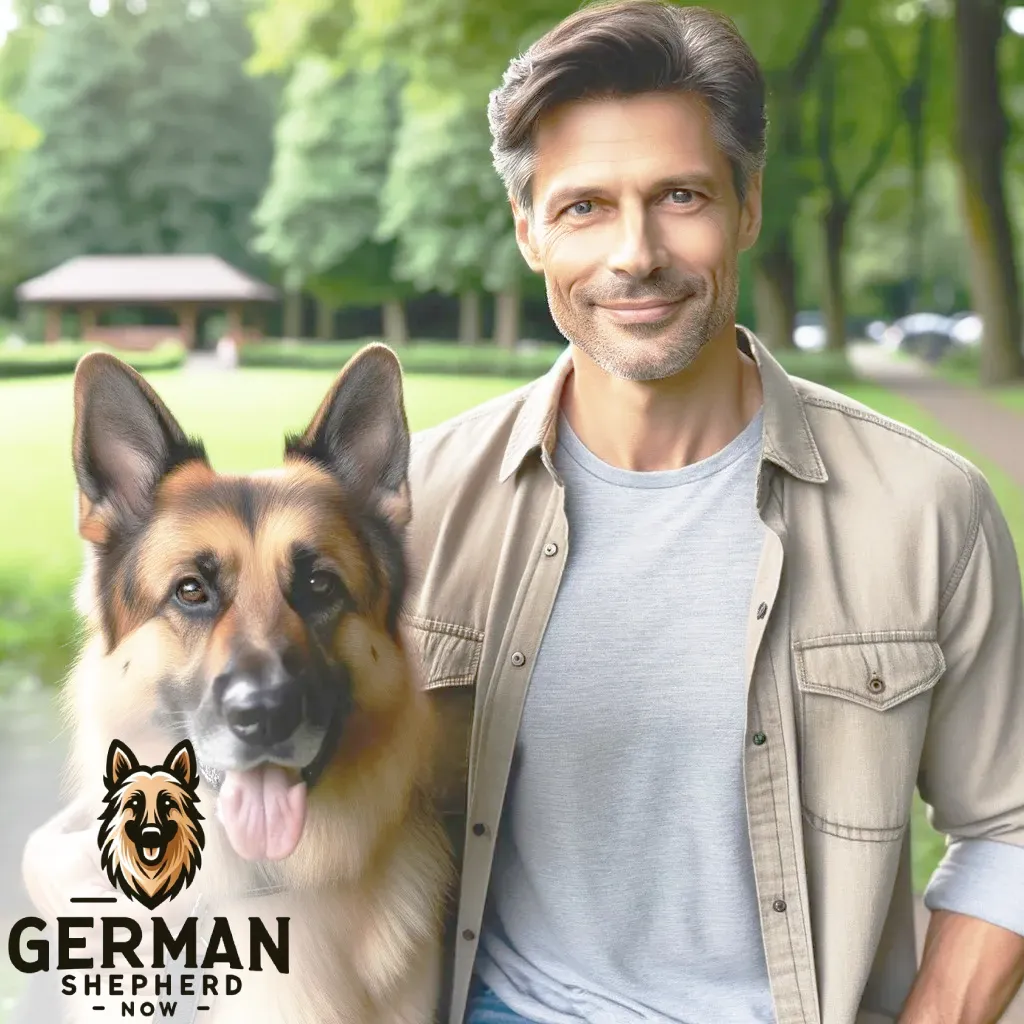Are German Shepherds Aggressive

German Shepherds can sometimes act aggressively, but this is not more common in them than in other dogs. If they seem aggressive, it’s often because of how their owners treat them.
They need good training and learning to get along with others to control their natural urge to guard their area. When brought up right, these dogs are very kind.
Their need to protect and guard, which comes from their past, can be handled with the right training and socializing.
Aggression in German Shepherds
German Shepherds are often misunderstood when it comes to aggression. It’s important to look at how they behave and how they’re trained to understand them.
Nature vs. Upbringing
Aggression in German Shepherds isn’t just about how they’re born; how they’re raised matters a lot. They are smart and like to protect, which people might see as aggression. But the way they’re raised is key.
A German Shepherd growing up in a caring, well-disciplined, and friendly environment usually won’t be aggressive.
But they might act more aggressively if treated badly, not trained right, or ignored. This shows why it’s so important for owners to be responsible. Aggression isn’t about the breed but how the dog is brought up and trained.
Protective Nature
These dogs were first bred to herd and guard animals, which makes them naturally protective. This can sometimes look like aggression, especially if they think their family or home is in danger.
With the right training, this instinct can be used well. It’s important to teach them what’s a real threat and what’s not.
When they’re well-socialized, they learn to manage their protective side and react the right way in different situations. Training like this keeps any unnecessary aggression in check, making them trustworthy and safe pets.
Socialization and Training
Early on, introducing German Shepherds to different people, animals, and places is crucial.
Puppies that experience many new things are usually more easy-going and less scared in new situations.
Being scared can make them aggressive, so a well-socialized German Shepherd is less likely to act out in fear.
Regular positive training helps them learn good behavior and builds a strong connection with their owner, which is important for managing aggressive behavior. The training should focus on listening, controlling themselves, and following commands, even when distracted.
Health Factors
Health problems can also lead to aggression in German Shepherds. They often get hip dysplasia, which can hurt and make them grumpy or aggressive.
Regular check-ups with the vet are important to catch and treat any health issues early.
A healthy German Shepherd will likely be calm and stable without pain or discomfort. Owners should watch out for sudden changes in how their dog acts, as it might mean a health problem.
Taking good care of their health and getting medical help can stop aggression linked to health issues and keep the dog healthy and happy.
Comparison of Aggression: German Shepherd vs. Other Dog Breeds
Understanding the aggression levels of different dog breeds is essential for potential owners, trainers, and anyone who interacts with these animals.
While each dog is an individual, certain breed-specific tendencies can be observed.
The German Shepherd, known for its intelligence and loyalty, is often perceived as more aggressive than other breeds. This perception might not always align with reality.
This table offers a comparative overview of aggression in German Shepherds versus other popular dog breeds based on general breed characteristics and tendencies.
| Breed | German Shepherd | Labrador Retriever | Bulldog | Beagle | Chihuahua |
| Size | Large | Large | Medium | Small | Very Small |
| General Temperament | Intelligent, Loyal, Protective | Friendly, Outgoing, Gentle | Docile, Willful, Friendly | Curious, Merry, Friendly | Lively, Devoted, Alert |
| Tendency for Aggression | Moderate (mostly protective) | Low | Low | Low | Moderate to High (often fear-based) |
| Common Causes of Aggression | Protection, Territorial, Fear | Rare, usually fear or pain-based | Possessiveness, Fear | Fear, Territorial | Fear, Territorial |
| Training for Aggression Management | High importance, responds well to positive training | Moderate importance, generally easy to train | Moderate importance can be stubborn | Moderate importance can be easily distracted | High importance, can be stubborn |
| Socialization Needs | High, crucial from an early age | Moderate, generally friendly | Moderate, can be aloof | Moderate, enjoys companionship | High needs early and consistent socialization |
| Exercise Needs | High, needs physical and mental stimulation | High, enjoys being active | Moderate, prone to laziness | Moderate, enjoys walks and play | Moderate, active in short bursts |
Note: It’s important to remember that while breeds have general tendencies, individual dogs can vary greatly. Genetics, upbringing, training, and socialization play a significant role in a dog’s behavior.
Therefore, evaluating each dog as an individual rather than relying solely on breed stereotypes is essential.
Managing Aggression in German Shepherds
German Shepherds are smart and loyal dogs. They might act aggressively if not raised right.
They’re naturally good guard dogs but need proper training and getting used to different people and places.
Here are easy ways to stop them from being aggressive:
Getting Used to Different Things Early On
It’s important to introduce your German Shepherd to different people, animals, and places when they’re young. This helps them feel less scared and behave better around new things.
Slowly and kindly show them different things, making sure they feel safe. This teaches them to be calm and not aggressive when seeing something new.
Going to puppy classes and dog parks and meeting new people and animals can greatly help.
Regular and Positive Training
German Shepherds like to learn and do well with regular, kind training. Be calm but firm to teach them to listen and respect you.
Use treats, praise, and playtime to encourage good behavior. Don’t be too harsh, as this can make things worse. Teach them simple commands like sit, stay, come, and heel. This keeps their brain busy and stops them from getting bored and acting out.
Exercise and Keeping Their Mind Busy
German Shepherds need a lot of exercise to stay happy. They have a lot of energy and can get bored and aggressive if they don’t move around enough.
Walks, runs, and playing are important for their health and happiness. It’s also important to keep their mind busy.
Try agility training, puzzle toys, and games that make them think. This uses energy and strengthens your bond with your dog, which helps stop them from feeling anxious and acting aggressively.
Understanding and Reacting to Their Body Language
Know your German Shepherd’s body language and react correctly to stop aggression. They’re uncomfortable or stressed if they growl, stiffen, or show teeth.
If you see these signs, step in before things get worse. Give them space, and don’t push them into scary situations. Teach them to relax and back off when you tell them to.
Knowing and reacting to their body language can stop them from getting too aggressive.
Getting Help from Experts
Talking to a dog trainer or behaviorist is a good idea if your German Shepherd is often or very aggressive. They can figure out why your dog is acting this way and make a plan to fix it.
Sometimes, aggression can be caused by health problems, so a vet check-up might be needed. An expert can teach you how to handle your dog better and ensure you do the right things to stop aggression.
Signs of Aggression in German Shepherds
German Shepherds are known for their bravery and loyalty, but like all dogs, they can display signs of aggression under certain circumstances.
Recognizing these signs is essential for preventing aggressive behavior and ensuring the safety of both the dog and those around it.
Aggression in German Shepherds can be triggered by fear, anxiety, territoriality, pain, or frustration.
Reading and responding to these early warning signs is key in managing and modifying their behavior. Here are some common indicators that a German Shepherd may be on the verge of aggressive behavior:
Body Posture
One of the first signs of aggression in German Shepherds is a change in body posture.
A dog that feels threatened or is preparing to be aggressive might make itself look bigger by raising its hackles (the fur along the spine), standing tall, stiffening its body, and holding its tail high. This posture indicates that the dog is alert and possibly aggressive.
Growling and Snarling
Growling and snarling are among the more obvious signs of aggression. A German Shepherd might bark to warn someone or another animal to stay away. This growling can escalate to snarling, where the dog shows its teeth.
It’s important to take these vocalizations seriously as they are clear communication from the dog that it is uncomfortable and may be preparing to defend itself.
Staring Intensely
An intense, fixed stare can be a precursor to aggression. This type of stare differs from the usual eye contact your dog makes with you. It’s a focused, unblinking stare directed at the perceived threat and is often a sign that the dog is assessing the situation and may be ready to take action.
Ears Pinned Back
The position of a German Shepherd’s ears can also indicate its mood. Ears that are pinned back against the head can be a sign of aggression, especially when combined with other behaviors like growling or baring teeth.
This ear position can also indicate fear, leading to defensive aggression.
Tail Position and Movement
The tail position can also provide insight into a German Shepherd’s emotional state. A tail that is held high and stiff or is wagging in a stiff, rapid motion can indicate arousal or agitation, which can precede aggressive behavior.
Conversely, a tail tucked between the legs might indicate fear, leading to aggression.
Snapping or Lunging
A German Shepherd that snaps or lunges at people or other animals displays overt signs of aggression. This behavior typically occurs when the dog feels its warnings have been ignored or is cornered without an escape route.
Snapping may not always lead to biting, but it is a clear sign that the dog feels provoked and is ready to escalate its response.
Biting or Nipping
Biting or nipping is an escalation of aggressive behavior and is usually a last resort for a dog.
This can happen if earlier signs of aggression are ignored, or the dog is in extreme fear or threat. It’s important to recognize and respond to earlier signs of aggression to prevent a situation from escalating to this level.
Decoding German Shepherd Aggression
Despite common misconceptions, German Shepherds are not more aggressive than other dog breeds.
Their perceived aggression is often a reflection of their upbringing and training rather than their breed.
German Shepherds possess a natural protective instinct stemming from their herding and guarding roots, which can be misconstrued as aggression.
Proper socialization and training from an early age are crucial in shaping their behavior. They exhibit gentle and loyal characteristics when raised in a caring and disciplined environment.
Conversely, negative treatment, lack of training, or neglect can result in aggressive tendencies.
Therefore, it’s essential to understand that aggression in German Shepherds is more about their environment and handling than their breed itself.

I’m Martin, and I grew up in the super cool city of Seattle. You know, the place with all the incredible mountains and forests? Yeah, that’s my playground!
Ever since I was little, I’ve been all about nature. I used to wander around the woods with a notebook, doodling all the cool plants and animals I’d find.
